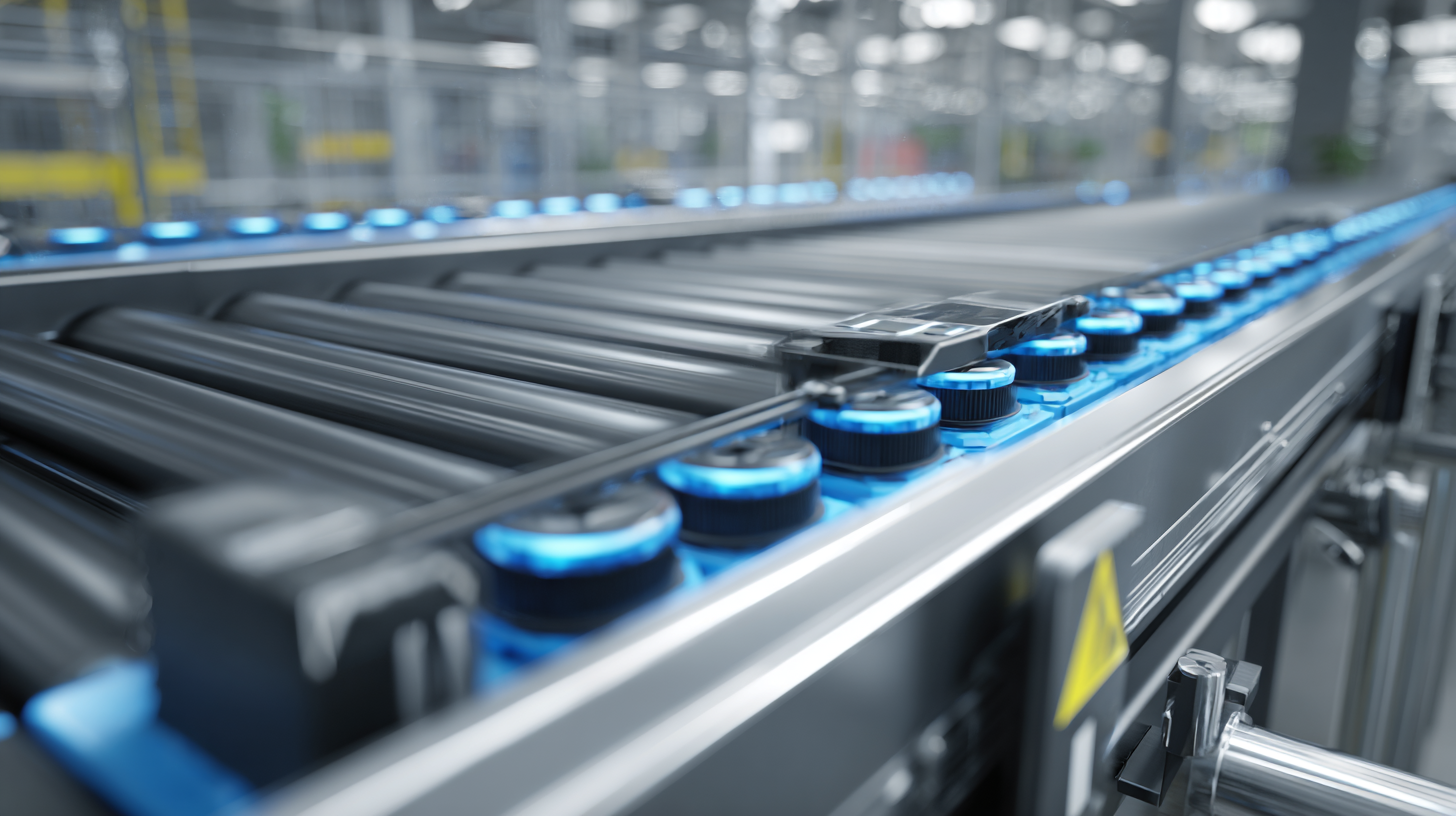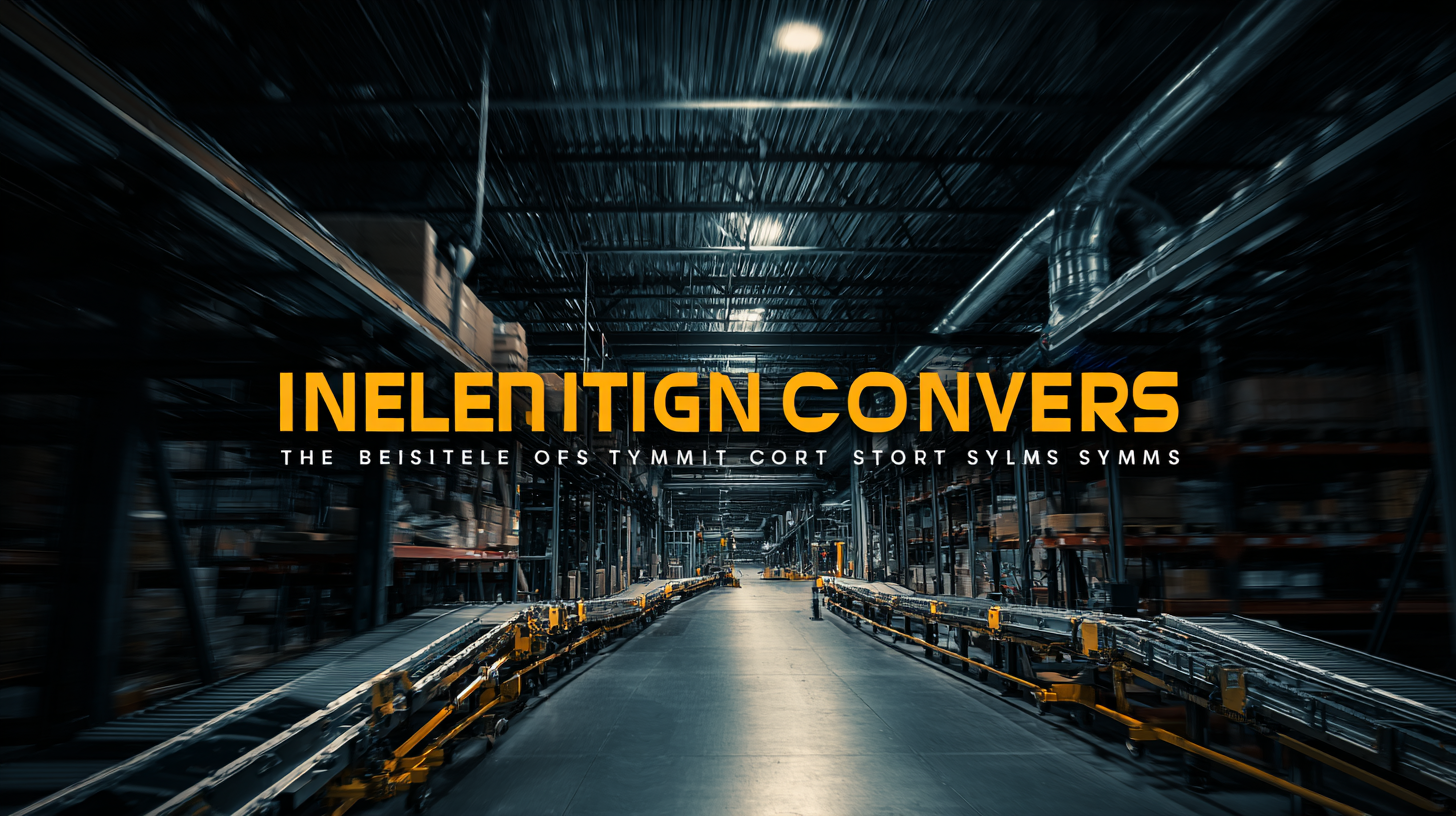In today’s fast-paced industrial landscape, the demand for Intelligent Conveyor Systems is surging, driven by the need for enhanced efficiency and automation. According to a comprehensive market analysis by MarketsandMarkets, the global conveyor systems market is projected to reach USD 9.2 billion by 2027, growing at a CAGR of 4.5% from 2022. This growth is largely propelled by advancements in technology, which enable the integration of artificial intelligence and IoT into conveyor systems, facilitating real-time monitoring and operational optimization. As global buyers seek high-quality suppliers, it becomes essential to approach the selection process with a strategic mindset. This blog serves as a definitive guide, providing insights on how to identify top-notch suppliers of Intelligent Conveyor Systems, accompanied by a practical checklist to streamline your sourcing process and ensure you make informed decisions in this rapidly evolving marketplace.

Intelligent conveyor systems are revolutionizing modern warehousing operations, providing enhanced efficiency and accuracy in supply chain management. According to the 2023 China Intelligent Warehousing Industry Market Research Report, the integration of technologies such as IoT, big data, artificial intelligence, and robotics into intelligent conveyor systems is fundamentally transforming logistics processes. These systems facilitate critical steps like inventory management, picking, and sorting, which are essential for maintaining streamlined operations.

Key features of these intelligent systems include real-time data tracking and adaptive routing, allowing for seamless integration with various warehouse management software. With the ability to optimize storage space and automate repetitive tasks, businesses can significantly reduce labor costs and minimize errors. The report indicates that smart warehouses that implement intelligent conveyor systems see efficiency improvements of up to 30%, showcasing the future of logistics. As the demand for faster delivery and personalized services continues to grow, investing in advanced conveyor technology becomes imperative for businesses aiming to stay competitive in the global market.
Intelligent conveyor systems have become a crucial component in modern automated material handling (AMH). These systems are categorized into various types, each designed to meet specific operational needs. The most common types include automatic storage and retrieval systems (AS/RS), automated conveyor and sorting systems, and automated guided vehicles (AGVs). AS/RS facilitate efficient inventory management by automating the storage and retrieval of goods, significantly reducing time and labor costs.
On the other hand, conveyor and sorting systems streamline the movement of products within warehouses and distribution centers, ensuring quick and accurate processing.
The global shift towards e-commerce has further accelerated the demand for intelligent conveyor systems, impacting market size and growth. The COVID-19 pandemic has underscored the importance of automation in logistics, reshaping operational strategies across industries. AGVs, in particular, have gained substantial traction because they enhance safety and flexibility in material transport. As industries continue to adapt to new challenges, the integration of smart technologies in conveyor systems is essential for improving efficiency and competitiveness in the supply chain.
In today's fast-paced manufacturing environment, the implementation of smart conveyor systems offers a multitude of benefits that can significantly enhance operational efficiency. One notable advantage is the optimization of workflow. Intelligent conveyor solutions are designed to automatically adjust to varying production demands, allowing for seamless integration with other automated processes. This adaptability not only reduces bottlenecks but also ensures that materials and products are moved swiftly to the necessary stations, ultimately increasing throughput.
Another crucial benefit of smart conveyor systems is their ability to provide real-time data and analytics. By utilizing IoT technologies, these systems gather valuable insights on various factors such as machine performance, inventory levels, and maintenance needs. This data-driven approach allows manufacturers to make informed decisions, improving productivity while minimizing downtime. Moreover, the predictive maintenance capabilities of intelligent conveyors can foresee issues before they escalate, facilitating timely interventions that extend equipment lifespan and reduce overall operating costs.

In recent years, conveyor systems have undergone significant innovations, revolutionizing supply chain operations across the globe. With the integration of AI and IoT, intelligent conveyor systems now offer enhanced automation capabilities that streamline processes and increase efficiency. These systems provide real-time data analytics to track inventory levels, predict maintenance needs, and optimize workflow, ultimately reducing downtime and operational costs.
One of the most exciting advancements is the development of modular conveyor systems that can be easily customized and scaled according to specific business needs. This flexibility allows companies to adapt swiftly to market changes without the need for extensive overhauls. Additionally, advancements in robotics and machine learning have enabled conveyors to interact seamlessly with autonomous vehicles and automated guided vehicles (AGVs), creating a more cohesive and responsive supply chain environment. As these technologies continue to evolve, companies that embrace intelligent conveyor systems will be at the forefront of supply chain transformation, setting new standards for efficiency and responsiveness in the industry.
| System Type | Key Features | Industry Applications | Technological Innovations | Efficiency Improvement (%) |
|---|---|---|---|---|
| Modular Conveyor Systems | Flexible configuration, easy maintenance | Manufacturing, E-commerce | IoT integration | 30% |
| Automated Guided Vehicles (AGVs) | Self-navigating, load-carrying capabilities | Warehousing, Distribution Centers | LIDAR and AI navigation | 50% |
| Belt Conveyor Systems | Versatile, suitable for bulk materials | Mining, Food Processing | Smart sensors for monitoring | 20% |
| Overhead Conveyors | Space-saving design, customizable tracks | Automotive, Aerospace | Wireless controls | 25% |
| Vertical Conveyors | Space-efficient, multi-level handling | Logistics, Retail | Vertical lift technology | 40% |
When evaluating the cost-effectiveness of intelligent conveyor systems, buyers must consider not only the initial investment but also the long-term operational efficiencies these systems offer. According to a report from the International Society of Automation, implementing intelligent conveyor systems can lead to operational savings of up to 30% through reduced labor costs and minimized downtime. These systems, equipped with advanced sensors and AI-driven analytics, enable real-time monitoring and adjustments that contribute to smoother workflows and less waste.
Moreover, a study conducted by the Material Handling Industry of America (MHIA) indicates that automation technologies, including intelligent conveyor systems, can increase productivity by 20%-25%. This increase is primarily due to the systems’ ability to streamline processes and reduce human error, which inherently lowers overall costs over time. Buyers should also evaluate the TOTAL COST OF OWNERSHIP (TCO), as the advanced maintenance features of intelligent conveyor systems can significantly decrease repair costs and downtime, further enhancing their cost-effectiveness over traditional conveyor systems.
